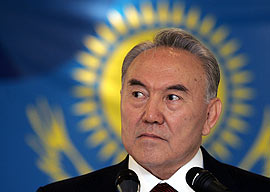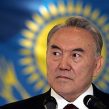
Kazakhstan’s Constitutional Referendum: Western Questions, Kazakh Answers (Part Two)
Publication: Eurasia Daily Monitor Volume: 8 Issue: 20
By:

Weighing the option to prolong President Nursultan Nazarbayev’s term to 2020 by referendum, Kazakhstan’s governing elite has engaged in an unprecedented open debate. The process is of a far broader scope than any old-fashioned deal-making among leadership factions. By the same token it has attracted Western criticism of a pre-emptive nature, which seeks to discourage Kazakhstan from holding the proposed constitutional referendum (EDM, January 27).
A credible international assessment of this proposal can only proceed from acknowledging Kazakhstan’s success story as a newly independent, rapidly modernizing, Western investor-friendly, Muslim-majority secular state. This process developed within only 20 years from Soviet scratch, and with generations still deeply marked by both Soviet and traditionalist mentalities in the country’s population. Given its vastness and diversity, the country’s territorial coherence requires particularly skillful handling.
Western criticism may have its merits, to be adjudicated in the ongoing dialogues with Kazakhstan and inside the country over the constitutional proposal. Severe external criticism, however, can only look biased and even forfeit credibility, as long as it fails to recognize the country’s overall success story, as the premise to any assessment of its constitutional system.
Given Kazakhstan’s young statehood, still-limited pool of experienced and savvy officialdom, its vast mineral wealth, and the two superpower neighbors, the foremost concern in shaping its constitutional system is to maintain the country’s stability under competent and effective leadership.
The present leadership has proven itself. An alternative leadership is not in sight thus far; and, should it emerge into view, it would have to be groomed and tested on its way to the top. A new-generation leadership is currently being groomed and tested from among the ranks of Kazakh graduates of Western universities. This is the first generation of Kazakh public servants untainted by Soviet-era mentalities. A large number of such graduates, who studied primarily in English-speaking countries under Kazakhstan’s Bolashak (“Future”) state scholarship program, are by now staffing the upper reaches of Kazakhstan’s ministries, state and private-sector companies, and regional administrations (the akimats). President Nazarbayev’s team has programmed this new generation’s way up.
Contract sanctity in Kazakhstan, with particularly high stakes in the oil and gas sector, is inseparable from the imperative of stable and effective governance. An evolutionary, programmed transition to new leadership, as the post-post-Soviet generation matures, can reassure Western investors that contracts would not be subject to surprise state moves or arbitrary renegotiation.
International observers often recognize that the multitude of challenges “requires an experienced and respected leadership in Kazakhstan, since the country plays a critical role in the region. Nazarbayev’s authority has been crucial for internal stability and inter-ethnic peace, as he is capable of balancing various interest groups inside the country,” as well as Russia and China externally (Institute for New Democracies, January 2011).
Should Kazakhstan ultimately decide to prolong Nazarbayev’s tenure by referendum, it will buy time for enacting two necessary political reforms starting in 2012. These are, first, electing a multi-party parliament on schedule in 2012 (to replace the incumbent, single-party parliament); and second –partly stemming from the first– to institute a clear constitutional procedure for presidential succession, ensuring a smooth transition in case of incapacitation or voluntary retirement of the head of state.
Kazakhstani officials assure their Western counterparts in informal discussions that a referendum, if held, would not affect the holding of parliamentary elections on schedule in 2012; and that a referendum and the elections would in any case be held under full monitoring by international observers. These assurances will gain added credibility through public top-level reiteration.
Should Kazakhstan ultimately decide to proceed with the referendum, Western criticism seems likely to heat up temporarily, then cool off, as the shared strategic interests take over. A comparison with Uzbekistan can be relevant in this regard, despite (or precisely because) Kazakhstan and Uzbekistan are different from each other in many ways. One difference is that Kazakhstan is receptive to Western critical input while Uzbekistan is obdurate.
In 2005, Uzbekistan was ostracized by the United States and the European Union over the Andijan events (armed rebellion followed by indiscriminate crackdown). Soon, however, the shared interests reasserted themselves. First the Pentagon, then other parts of the US government started returning to Uzbekistan from the corner in which they had painted themselves. The European Union followed, albeit in its characteristically slow ways.
On January 24, Uzbek President Islam Karimov was received by EU Commission President Jose Manuel Barroso, Energy Commissioner Guenther Oettinger, and other officials in Brussels, as well as by NATO Secretary-General Anders Fogh Rasmussen. The discussions mapped out plans and projects on energy supplies, transport and commercial access, internal economic and structural reforms in Uzbekistan, as well as regional security issues related to Afghanistan, counter-terrorist and counter-narcotics efforts. An EU diplomatic mission will open in Tashkent (EurActiv, EUObserver, January 24, 25).
US and EU relations with Kazakhstan are incomparably more highly developed and more diversified than those with Uzbekistan. The strategic stakes are accordingly far higher. Whichever way Kazakhstan decides to proceed with the referendum proposal and its constitutional system, the shared strategic interests will sooner, rather than later prevail, and durably so, in the Kazakhstan-West relationship.




